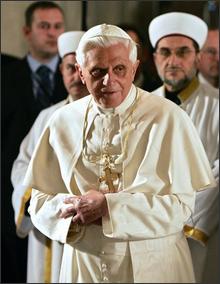



NOW ISS ZE TIME ON "SCHPROCKETS" VEN VE DANCE




Dip your fevered mind and wearied limbs into the healing waters.

Dearly beloved, today our Savior is born; let us rejoice. Sadness should have no place on the birthday of life. The fear of death has been swallowed up; life brings us joy with the promise of eternal happiness…Let the saint rejoice as he sees the palm of victory at hand. Let the sinner be glad as he receives the offer of forgiveness. Let the pagan take courage as he is summoned to life…Let us throw off our old nature and all its ways and, as we have come to birth in Christ, let us renounce the works of the flesh…
Christian, remember your dignity
Christmas sermon of Pope St. Leo the Great, ca. 450 A.D.

 first one I heard about and supported: the purchase of television production equipment, and of industrial sewing machines, destined for the people of Ar Ramadi.
first one I heard about and supported: the purchase of television production equipment, and of industrial sewing machines, destined for the people of Ar Ramadi.

And gentlemen in England, now a-bed,But it still holds true, or could if political will dared to match military will.
Shall think themselves accursed they were not here
… the king himself hath a heavy reckoning to make, when all those legs and arms and heads, chopped off in battle, shall join together at the latter day and cry all 'We died at such a place;' some swearing, some crying for a surgeon, some upon their wives left poor behind them, some upon the debts they owe, some upon their children rawly left.King Henry argues, correctly, that, "Every subject's duty is the king's, but every subject's soul is his own." I still have no quarrel with the principal aim (unfortunately left unstated) of the invasion of Iraq, which was to establish a democratic foothold in the Muslim world, for the example and betterment of the other, largely failing, Islamist societies in the region. And I think it is fair to say that no one "purposed" the deaths of any soldier or civilian when the invasion was undertaken.
… Now, if these men do not die well, it will be a black matter for the king that led them to it…
I'm willing to accept that you folks know something I don't, but as far as I'm concerned this Secretary of Defense has failed to guide the most powerful, well-trained, fully equipped, and intelligent military force in human history in the taking and holding of a handful of key areas within one medium-sized country where the invading force WAS originally welcomed as liberators. When his favored course of action was over-ruled by the Commander-in-Chief, it was his duty to throw all his energy and talent into the successful pursuit of the chosen strategy, and it is patently obvious that this was not done.So, Mr. Rumsfeld—Abu Ghraib your worst day? Are you serious?
Most disheartening was to hear that Mr. Rumsfeld's "worst day" was the revelation of the Abu Ghraib mess. Sorry-- wrong answer. If his worst day wasn't the one where we learned what had been done to Privates Menchaca and Tucker (an atrocity that was allowed to pass almost unnoticed) then he has spent way too much time fretting about the New York Times, and not enough figuring out how to eradicate the jihadist plague.
His final flurry of snowflakes could have been drawn from the work of any number of serious pro-war journlists and military experts TWO OR THREE YEARS AGO. It is regrettable that he has been demonized so excessively by the extreme left, but this fact should not blind the rest of us to his faults and failures. We have been spinning the tires on this under-armored humvee for nearly three years now. Hail and farewell, but, alas, too late.

If a young fellow has an option of having a decent career, or joining the Army to fight in Iraq, you can bet your life that he would not be in Iraq… If there's anyone who believes these youngsters want to fight, as the Pentagon and some generals have said, you can just forget about it. No bright young individual wants to fight just because of a bonus and just because of educational benefits. And most all of them come from communities of very, very high unemployment.And as if that’s not enough, no less than MATT FREAKING DAMON [Hat-tip: Hugh Hewitt] has let it be known that he doesn’t’ think it’s fair that
...it seems like we have a fighting class in our country. That's comprised of people who have to go for either financial reasons or-- I don't think that that is fair.It’s so unfair he just can’t even talk about it! He gets all tongue-tied and borders on being COMPLETELY INARTICULATE! It’s just that unfair.
And if you're gonna send people to war ... then that needs to be shared by everybody, you know, and if the president has daughters who are of age then maybe they should go too.But should they be free to make that decision themselves, like every other person who has ever put their toe into a military boot since 1973? Or should they be “sent” because of public pressure from voices of authority like Matt Freaking Damon? And should Matt Damon be free to decide whether he should serve in the war? Or should he be sent, drafted, like Elvis? Or should the public put so much pressure on him that he should enlist himself, like so many REAL STARS from Hollywood’s “Golden Age” did? People like Jimmy Stewart, Tyrone Power, Lee Marvin, Clark Gable, and many others, whom the admittedly talented Damon couldn’t hold a candle to on the screen, much less in the arena of public service.

This is a true story.....Check out this photo from our mess hall at the US Embassy yesterday morning. Sen. Kerry found himself all alone while he was over here. He cancelled his press conference because no one came, he worked out alone in the gym w/o any soldiers even going up to say hi or ask for an autograph (I was one of those who was in the gym at the same time), and he found himself eating breakfast with only a couple of folks who are obviously not troops.Further stories of how far Green zone personnel went to avoid encountering the Senator are here from Ben of Mesopotamia (via Instpaundit). His money quote:
Rumor has it that somebody gave his [Kerry’s] helicopter flights the designation "Weasel 61."Apropos of all this, may I remind the reader that I’m the proud mom of a Magna Cum Laude graduate of St. Anselm College in New Hampshire, with a major in history and a specialist certificate in Classics, who on his graduation day was commissioned into the United States Marine Corps. And about a week ago I found out that another son, soon to graduate with an A-minus average from Providence College in Rhode Island, with Political Science major and a Theology minor, will be applying to the United States Navy Officer Candidate School.
…He will cover you with his pinions,
and under his wings you will find refuge;
his faithfulness is a shield and buckler.
You will not fear the terror of the night,
For he will give his angels charge of you
to guard you in all your ways.
On their hands they will bear you up,
lest you dash your foot against a stone.

The second day of the ancient Christmas season was (and still is) called “Boxing Day,” and such was the theme of my last-year's post-Christmas musings.
A bunch of my friends thought I did a good job of it. So here's the post again. It's more timely this year! There are still seven more shopping preparation days until the Season begins in earnest.
Here [slightly revised] from December 27, 2005:
BOXING DAY
It’s a rare moment when I think there are advantages to living in
One of these last desperate traces of civilization, the official Boxing Day holiday, alas, has disappeared in distinctive Canadian fashion: the laws which once decreed that no commerce should be allowed on Sundays and statutory holidays have been erased by being repeatedly broken. It’s a classic Canadian form of “court challenge”— you just keep breaking the law until you break the system’s resolve. (Saves a lot of time and headache involved with actual statutory amendment enacted by actual elected legislators.)
However, the cultural concept of Boxing Day still lingers— the day after Christmas when, back in “olden times” (that period of history prior to 1968 about which most modern students learn almost nothing) servants could relax a bit and the gentry would treat them to the annual holiday bonus: boxes stuffed with money and gifts. It’s still a day which conjures up, for some of us, images of hanging out and doing nothing, trying out the Christmas treasures, eating the left-overs. I last celebrated it by rising at about 2:00 p.m. and soaking in the tub from 4:30 till 6:00, while drinking champagne and orange juice and reading about architecture. This strikes me as an appropriate way to pass a traditional “holiday” in the literal sense (Holy Day).
Unfortunately, Canadian society has succumbed to moving the traditional after-Christmas sales to Boxing Day, where they had once been staved off until December 27. On that day, somewhere in the distance were the sounds of cash-registers dinging (or whatever it is these computerized models do), but no one in our house was aware of it.
Canada’s Thanksgiving is in October (usually on or about Columbus Day), too far ahead of the Christmas season for a wild mob scene— besides, without a November Thanksgiving, and its Hallmark-card-merchandising-opportunity to hold them back, Canadian stores have been stocking Christmas items since late September— so what’s the rush?!
Many might be prepared to say a lot of nasty things about people for whom Christmas has descended into this materialistic morass, but more than anything else I think they are to be pitied— they have been victims of a terrible robbery. It is the province of the churches to teach the meaning of Christmas, and to raise the alarum about its abuse and perversion. It’s also the province of the churches to fill their own pews—which is where the initial failure lies, and the great robbery accommodated. If Christmas is rather less than “merry”— an exhausting, pointless, and expensive ordeal, as we often hear of it— some research into an antidote would seem to be in order.
I have given some thought over the past few years as to what might be the key ingredients to a Merry Christmas, and why I usually find it pretty easy to have one.
At the root is the question of appropriate expectations.
When Christmas is all about the awe and excitement of small children, for whom every aspect of the season is cause for joy, the natural melancholy that comes with the end of the party and the turn of the year can be successfully suppressed, for quite awhile. But Christmas changes as children get older—the magic diminishes, and the sense of inexorably passing time increases.
If you try, you can learn to accept that the highs and lows of seasonal celebrations are to be expected— relentless highs are artificial, and suppressing the melancholy is unhealthy. Those who are unprepared for, and resent, the post-gift-grab-and-turkey-blow-out depression, have failed to realize that they have set themselves up for this. It’s preventable.
After due consideration, I’ve developed some simple prescriptions for recovering the Merry in Christmas. It starts with what might seem superficial (but isn’t) and then works its way to the deeper stuff. That sounds backwards, but it’s a way of easing into the optimal results.
Memo for next Christmas: plan well in advance to approach the Christmas season with new strategies relating to:
I. MUSIC
II. SHOPPING
III. DECORATING
IV. PRESERVING ADVENT
Note: the use of the word “Merry” to describe the perfect Christmas in no way implies that this is a formula geared to non-religious seasonal observance. It is the Christian tradition to be merry at the prospect of the Nativity.
That’s the Nativity of Jesus Christ, the promised Messiah, the Redeemer of all mankind, born into history at a time and place commemorated once a year by Christian believers.
While it is possible for the non-believer to enter into some type of generic seasonal spirit with all good will and stuff, the simple truth is (to be blunt), if you are not prepared at least to contemplate the historical reality of the birth of Jesus, and the significance attached to it by Christians, your participation is basically a delusion. And you deprive yourself of its riches.
Christmas 2005 saw some fanning of the flames of the Culture Wars on the part of those who object to the dilution of the holiday’s historical/factual identity into some bizarre No-Name Seasonal Warm-Fuzzathon — the complaints are well-founded (if not always well-argued), and the controversy warranted. (Progress, and fewer controversies, duly noted for 2006.)
But among the voices in favor of keeping “Christmas” in the public vocabulary are those who have argued that non-Christians should be content with trees and carols and greetings called “Christmas” because these things have lost their religious meaning anyway, so their use is palatably secular.
ARGH-H-H-H-H-H!!!!!!
Please, people— your kind of help we don’t need. Christmas isabout the coming of Christ, and the birth of his Church. Deal with it. And don’t insult Jews by pretending it’s their season too—they’d be the first to tell you it is no such thing.
Hanukkah is not a season, but a minor event in the Jewish calendar, significant on a scale with St. Patrick’s Day for Christians. Neither is Christmas pagan in origin, as some multi-culti types claim—it successfully usurped and more or less obliterated a pagan seasonal festival, co-opting some of its trappings (like trees) which were easily absorbed into existing authentically Christian motifs—turning it from a fearful exercise in god-placation and charms against the cold and dark, to a festival of miraculous birth and promise and tenderness directed towards a helpless infant destined to rescue humanity.
This is not to say that paganism can’t capture the flag back again. It’s working very hard at exactly that, in the guise of benign-looking secular banalities and orgies of materialism. These things are not “merry” as applied to Christmas—they are fleeting and corrosive distractions.
RECOVER A TRULY MERRY CHRISTMAS, by starting with:
I. MUSIC
The importance of music to the spirit of Christmas cannot be overstated.
Choose wisely. Ban mercilessly.
I can’t remember when it dawned on me, but at some point I came to realize that the most important ingredient in the Merrying of Christmas in my life has been, by far, the discovery of styles of music that are imbued with the true meaning and spirit of the Nativity.
Our house was like everybody else’s in the 1950’s— Christmas music was the usual mix of classic carols and more modern pop hits. We got the big cabinet stereo in about 1958 and our first Christmas LP album was a little bit of a departure—an important one. It was the Robert Shaw Chorale singing traditional carols a capella. The sound was clear and rich and unadorned. Other versions paled by comparison.
Yes, we got our Bing Crosby album too, and over the years my father kept bringing home the annual pop artist collection “Great Songs of Christmas,” put out by Goodyear (!), that gave us Barbra Streisand warbling “Silent Night” and Bob Goulet crooning I forget what— joined by Johnny Mathis, Nat King Cole, and, oh yes, the Mormon Tabernacle Choir. They were pleasant enough, but even as a child I understood that they lacked what the Robert Shaw album had — had I been able to articulate it then, I might have given new meaning to the term “Christmas balls.”
Then in the early 1960’s my sister sent away to Life Magazine for a set of books on the Pageantry, Glory, and Merriment of Christmas, with its accompanying LP called “The Life Treasury of Christmas Music”— and a treasure it was. The record changed everything about our sense of how Christmas ought to sound. Its selections included Gregorian chant (which we already knew about, but took for granted), and an international array of medieval dance rhythms on period instruments, Renaissance polyphony, organ solos, 18th and 19th-century carols, and a little touch of Huron from Ontario.
From here we developed a taste for early music in general, but especially that of the Christmas season, which introduced us not only to new notions of harmony and the joys of percussion, but to the fuller spectrum of religious truths which are so often the subject of medieval popular song: our forebears did not hesitate to place the miraculous birth of the Holy Babe within the context of his larger purpose, a life destined to end in agonizing redemptive sacrifice. Furthermore, they were not shy about speculating how strangely the circumstances of the Nativity must have struck those ordinary folk lacking the benefit of an Archangelic visitation— including Joseph himself, the subject of numerous songs that speak to his cluelessness and resentment of the implausible claims of his pregnant fiancée.
Christians of an earlier time could meld greater awe and faith with a more intimate human relationship with their Savior than modern man achieves, and all without need of the glitzy sentimentality so typical of our musical chestnuts and greeting card art. The wider, more realistic perspective of our religious ancestors from centuries long past, as expressed in their music, is the best possible antidote to the artificial high and the post-indulgence deflation too typical of the modern Christmas celebration. Life was damned hard for those faithful folk— and they accepted, even celebrated, the melancholy with the joyous. So….
…want a merrier Christmas through MUSIC? – Here’s the prescription:
Rule #1: Listen to NO Christmas music written after 1900.**
Rule #2: Be VERY selective about Christmas music written after 1700.
**[Okay, okay-- we'll make an exception for "In the Bleak Midwinter"-- but that's it! Sheesh.]
Just try it! For one season at least!—yes, you’ll have to give up Bing and his “White Christmas” (but that will also relieve you of his execrable “Mele Kalikimaka” in the process—double bonus).
You’ll hear more than your share of old favorite carols and pop schlock in the stores and elevators—try to filter it out of your head, but if you feel called to absorb some Frosty or Mama Kissing Santa Claus, confine your listening to the muzak of public places.
At home, keep to the older musical traditions, whose texts are rich in the Biblical context and lived experience of the need for redemption through the Divine Child and his generous earthly parents.
Recommended introduction to the world of real Christmas music:
Christmas Now is Drawing Near – by Sneak’s Noyse [Saydisc Records] [my #1 favourite album of all time]
A Tapestry of Carols – by Maddy Prior and the Carnival Band [also Saydisc]
A
On Yoolis Night or anything recorded by the Anonymous 4
The Carol Albums - by the Taverner Consort under Andrew Parrott
The Festival of Nine Lessons and Carols – lots of recordings, the one from King’s College,
Thys Yool – A Medieval Christmas – by the Martin Best Ensemble [Nimbus Records]
An American Christmas - by the Boston Camerata under Joel Cohen [Erato records]
II. SHOPPING
Buy stuff online.
I’ve had great luck with it, mostly using catalogues I started ordering from by phone long before I had a computer.
There are two benefits to this: (1) It keeps you out of malls, which are symphonies of schlock, crass and brassy pageants of crap-for-sale in the din of lousy music and frantic people with cranky kids. (2) If you get the right catalogues and websites, the stuff is a lot more interesting than what’s in the stores.
Have a look at Acorn, Signals, Wireless, The Smithsonian, The
I’m not putting links up for these sites, just to emphasize that no commercial considerations have encouraged me to list them—someday when I get my web-act together maybe I’ll run their ads. So….
…want a merrier Christmas despite the SHOPPING? – Here’s the prescription:
Do whatever it takes to stay out of malls and monster stores. Online shopping is leisurely and peaceful and, in my experience, efficient, creative, and reliable.If you really have to hit the stores, try something out of the mainstream, like gift certificates from a gourmet cheese and deli shop, or cooking school. They smell good and tend to be located in quiet corners of the world.
III. DECORATING
You’ll start to see everything imaginable for decorating your home, inside and out, slipping stealthily into the stores in late September— early October at the latest.
IGNORE IT.
If you must buy ahead, do it in late November and stow it until at least my birthday (December 11).
Start with some decorations which are attractive and festive but are clearly consigned to Advent: a Jesse tree, an Advent wreath, an Advent calendar [on a religious or wintry theme, revealing angels or artworks or folk around the manger— remember that Spongebob Squarepants and Scooby-Do have NOTHING to do with Advent—no cartoon calendars please!], the Christmas crib [permissible early, but keep the baby in storage until Christmas Eve, and if possible place the wise men and shepherds so they can be walked toward the manger over a period of weeks—kids love to do this, but space doesn’t always allow for it].
Think purple, not red and green yet (even poinsettias will cooperate with you in this).
It is fair to say that the true Spirit of Christmas is not invoked by lighting up your yard like a Vegas whore-house— try to keep it under control. The latest fad seems to be these inflatable nylon giants: snow families, teddy bears, etc. They’re generally sort of cute, but bloated (literally) and ostentatious and a little creepy. And remember— accidents happen— what could be more pathetic than a flaccid Father Christmas lying face down on your lawn.
The centerpiece of any indoor decoration is going to be the Christmas tree. Anyone for whom it is not an untenable financial or physical burden, or a danger to your health (like needles make you break out in hives), should get a REAL TREE—please! The fakes are getting better, but they have one big problem: they’re fake. We try to avoid that in all respects this time of year.
When it com es to decorating the tree, many individual tastes will play their part—and many temptations to no taste at all. Your best bet? Decorate your tree only with things that any small child would like to (1) eat, (2) play with, (3) gaze at for an hour. (If you don’t use actual toys, then plausible, well-made replicas or miniatures will do.) Don't forget to lay in a few olive wood ornament
es to decorating the tree, many individual tastes will play their part—and many temptations to no taste at all. Your best bet? Decorate your tree only with things that any small child would like to (1) eat, (2) play with, (3) gaze at for an hour. (If you don’t use actual toys, then plausible, well-made replicas or miniatures will do.) Don't forget to lay in a few olive wood ornament s made in Bethlehem. They are attractive and symbolic, and their purchase supports the disappearing Palestinian Christian community who are caught in the crossfire of the Middle Eastern terror wars.
s made in Bethlehem. They are attractive and symbolic, and their purchase supports the disappearing Palestinian Christian community who are caught in the crossfire of the Middle Eastern terror wars.
Supplement with religious symbols, memorabilia specific to your family, animal life (birds, nests, small furry things), anything made by your children. Nothing glads the heart and catches the eye like old-fashioned blown-glass figures and objects, dotted here and there between the less shiny and more natural objects.
Everybody likes vases and pots of greens around the house—pine, fir, holly, boxwood, ivy, juniper— which should be real if your allergies can handle it. There are beautiful accents to be found in the shapes and warm colours of fruits and berries, for both the vases and tree ornaments (fakes are getting pretty good, and less likely to bring fruit flies than the real thing). So…..
…want a merrier Christmas through DECORATION? – Here’s the prescription:
Keep it warm (colours); keep it real (if possible), natural and simple (outdoor lights and displays); keep it in reserve till well into Advent. Approach it all with an eye to childish delight. Avoid anything that looks like the work of an interior designer – real people don’t live like that.
IV. PRESERVING ADVENT
Now to the serious part. The best way to guarantee a Merry Christmas is to precede it with a real Advent, traditionally a season of preparation only slightly less somber than Lent. In fact, Advent was once colloquially referred to as “St. Martin’s Lent” since it was originally established to last from the feast of St. Martin of Tours, November 11, to Christmas Day (about two weeks longer than the modern Advent season).
There are still those who try to observe the spirit of Advent fairly strictly, avoiding all parties, trees, decorating, etc., until Christmas Eve. In this mode, our forebears postponed celebration until the actual feast of Christmas, and then enjoyed not just an explosive day of excess and abandon on December 25, but on that day inaugurated a 12-day Christmas “season” in the truest sense.
The modern world makes this arrangement problematic. In “olden times” the whole community agreed that the daily grind would come to a halt for the duration of the festivities, so no one was penalized for slacking off—there was no concern about losing business to competitors when little business was conducted anywhere. Today, however, no employed person is allowed to neglect work for a twelve-day stretch after Christmas— at best, we get one day’s grace before most of the community is called back to the full schedule of work obligations. Luckier folks see their offices close for the whole period from Christmas to New Year’s, but only when the calendar cooperates and there are just a couple of work-days between the two holidays.
For this reason most of us are drawn into abbreviating even our shortened Advent, and start the decorating and partying by the middle of December, in the knowledge that big parties after the 25th have a way of seeming anti-climactic. It’s hard to know whether this feeling is cause or effect— whether we ourselves have created that weird post-Christmas plummeting of joy because we gave in to the pre-Christmas overkill in the first place— but it is reality, and our collective devotion to work prevents us from turning back the clock on this issue completely.
Still, the recovery of some sense of Advent – achieved by restraining the impulse to start Christmas in September (as the stores would have us do), to get the lights and the tree up in the first week of December (only to put the poor old tannenbaum out at the curb with the other garbage on the 27th ), to spend the whole of Advent in a stressful buying-spree that takes till Lent to be paid off — is the shortest, straightest path to a truly Merry Christmas: a time to meditate on the coming mystery, on how profound is our need to be saved and to reconcile ourselves with God and each other,
Step 1: tame the calendar—make the effort to schedule the festive activities as close to the 25th as your routine allows; mark the January calendar with Twelfth Night and do your best to keep the tree and decorations in place until then; schedule some relaxed social gatherings for the weeks AFTER Christmas, see friends and family, watch football, hang out, eat left-overs and drink mimosas. Can’t be beat.
First make Advent a genuine season (not just Christmas foreplay), then make Christmas a genuine season (not just a food-and-toy orgasm).
Step 2: While you’re not partying and shopping like mad in early December, find some contemplative reading material about Christmas.
I have several books that have a prayer or reading per day of Advent (Bishop Sheen compiled one)-- and guess what? I’ve never gotten through one yet. But even if you can’t rely on making time for a reading every day, it’s still worthwhile to keep some appropriate material close at hand for the spare moments that present themselves. There are old books of Christmas poems and stories— some are anthologies, others are the works of a single author like Washington Irving, or Charles Dickens’ short stories that aren’t about Scrooge. Listen to or read Dylan Thomas’s A Child’s Christmas in Wales. Take a random quiet moment here and there if you can’t manage the daily meditation. So….
…want a merrier Christmas, period? – RECOVER ADVENT.
Discipline your calendar, feed your soul, believe in two seasons instead of one or two blow-outs, spend within your means, and remember why we are doing this at all—“Season’s Greetings” and “Happy Holidays” give you no guidance on this matter.
Even if your particular faith, or your lack of it, makes you resistant to involvement in something called “Mass,” you still can’t get around the fact that what we celebrate this time of year is called “Christ’s Mass”— it belongs to him, the little bundle in the straw whose humble, helpless entry into our world tells you all you need to know about how the faith to which he calls us is like no other movement or cult or philosophy that has ever captured the heart and imagination of mankind.
And therefore be merry,A Virgin Most Pure, from A Tapestry of Carols
Rejoice and be you merry,
Set sorrows aside--
Our Savior, Christ Jesus
Was born on this tide.
It's a predictable film... ...many Biblical clichés...Imagine! Predictable!
If only there was a stronger thread of humour...Ya-a-a-a-h-h-s--- where were those laughs?
...the young Mary... should have been reinterpreted with a lot more edge.Ab-so-LUTE-ly! What's a Blessed Virgin without edge?
 [mosaic of the Theotokos, Hagia Sophia, Istanbul, Turkey]
[mosaic of the Theotokos, Hagia Sophia, Istanbul, Turkey]
 The three dots represent, in south-bound order, Istanbul, Jerusalem, and Mecca. Not quite a straight line, but close enough that no one standing in a mosque in Istanbul would be able to perceive the slightest difference.
The three dots represent, in south-bound order, Istanbul, Jerusalem, and Mecca. Not quite a straight line, but close enough that no one standing in a mosque in Istanbul would be able to perceive the slightest difference.







"Non-hysterical"
Kathy Shaidle, Five Feet of Fury
"Intelligent and thoughtful"
Julian Lopèz-Morillas, Bay area actor, director, 'Speare chucker, and old pal (still thinks I'm bananas)
"She made other comments, but they were too risqué."
David Warren, Canajun wordmonger and doge, davidwarrenonline


